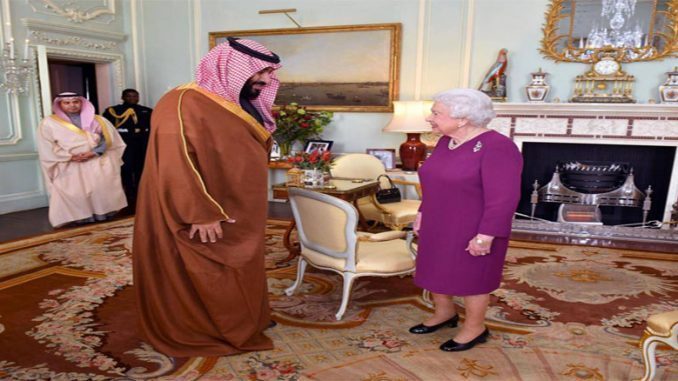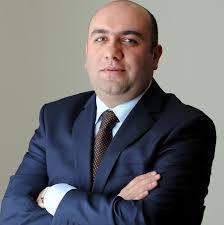
Mohammed bin Salman, the youthful and ambitious Saudi crown prince, arrived in London on Wednesday for a three-day visit shrouded in controversy. Critics protested the British government’s close ties to Riyadh, lambasting the kingdom’s human rights record as well its escalation of the war in Yemen, which has led to an unmitigated humanitarian disaster.
Meanwhile, the crown prince’s defenders unleashed a public-relations blitz celebrating the liberalizing reforms being introduced under his watch. Ads in British newspapers and billboards across London hailed how Mohammed was “opening Saudi Arabia to the world.” His supporters blanketed social media with stories of his campaigns to curb corruption and give more freedoms to Saudi women.
Mohammed is indeed shaking things up at home. Recent interviews with prominent Washington Post and New York Times columnists show how eagerly he is styling himself as a millennial reformer steering his nation into 21st-century modernity. But he’s also playing a central role in an international realignment that is perhaps more important.
Before arriving in Britain, Mohammed stopped in Cairo to visit Egyptian President Abdel Fatah al-Sissi, a close Saudi ally. Apart from meeting with Sissi, the crown prince also called on Pope Tawadros II, the head of Egypt’s ancient Coptic Church. It was cast as a sign of Mohammed’s liberal enlightenment: The scion of a regime notorious for embracing and exporting an ultra-conservative brand of Sunni Islam was reaching out to one of the region’s embattled minority faiths.
But the crown prince was also sending a message to his supposed enemies. In remarks reportedly made this week in a meeting with Egyptian newspaper editors, he pointed to a “triangle of evil” in the Middle East made up of Iran — Riyadh’s perennial foe — Islamist extremist groups and Turkey. His rhetoric seemed to echo the notorious “axis of evil” bluster of the George W. Bush administration.
The inclusion of Turkey raised eyebrows and sparked an angry backlash on Turkish social media. There is no love lost between Turkish President Recep Tayyip Erdogan and leaders in the region, especially in the case of Sissi, who brutally suppressed Islamist factions favored by Erdogan after taking power in a 2013 military coup. To this day, Erdogan and his supporters memorialize a crackdown on Muslim Brotherhood activists in Cairo that summer, which saw hundreds, perhaps thousands, of people killed.
After reports about Mohammed’s comments emerged, Saudi officials moved to placate their critics. “It was alleged that the Saudi Crown prince pointed to Turkey via the words ‘some evil powers in the region,’ ” read a statement from the Saudi Embassy in Ankara. “We would like to state that these ‘evil powers’ are the Muslim Brotherhood and radical groups.”
But that hardly obscures the ill will between Riyadh and Ankara. The two countries represent opposing visions for the Middle East: Erdogan was a champion of the 2011 Arab Spring and cheered on the democratic victories of Islamist political parties across the region. Saudi Arabia, meanwhile, reviled parties such as the Muslim Brotherhood and hated the upheavals that plunged much of the old authoritarian order of the Arab world into crisis.
While Erdogan was championing the Turkish model of democracy as a blueprint for the region, deposed Arab autocrats were finding sanctuary in Saudi Arabia. Now, numerous political Islamists from Egypt and other Arab states are in exile in Turkey, and Erdogan cuts an increasingly isolated figure, raging at both the West and his Arab rivals.
In recent months, Turkey has been fighting a media war with both Saudi Arabia and the United Arab Emirates, which also detests Erdogan’s coziness with Islamists and support of its rival, Qatar. In December, Erdogan and the UAE’s foreign minister traded insults over Ottoman history in the Arabian peninsula. This week, the Saudi crown prince reportedly chided Erdogan’s desire for his own “caliphate” across the Middle East.
This week, a major Middle Eastern satellite network based in the UAE — but believed to be majority Saudi-owned — even stopped airing Turkish soap operas, which are tremendously popular across the Middle East and North Africa. The decision is thought to be an extension of the heated political climate.
In that climate, Erdogan has drawn closer to Iran, particularly in the fitful project to broker some sort of truce in Syria. But that hardly justifies being lumped into the “triangle of evil” by the Saudi crown prince. Turkey and Iran find themselves on the opposite sides of the Syrian battlefield in many places. And while Turkey is justifiably criticized for allowing myriad Islamist fighters to slip into Syria in the early years of the war, it has also suffered greatly from Islamic State terrorism attacks at home.
Meanwhile, Shiite Iran is ideologically anathema to Sunni jihadist groups. In linking the two, Mohammed took a page directly out of the playbook of Israeli Prime Minister Benjamin Netanyahu, who has insisted repeatedly that the Islamic Republic and Islamic State should be seen in the same light.
That, too, is telling. Mohammed is advancing an agenda that is bringing Riyadh into tighter cooperation not only with a hawkish Trump administration, but with Israel itself. Although the Saudis aren’t publicly admitting it, Israeli officials privately confirm that there is growing strategic cooperation between the two countries, as well as Egypt. Think of it, perhaps, as another triangle in a region where new enmities and rivalries constantly take shape.
*The article was written by Ishaan Tharoor, a foreign affairs writer at The Washington Post.



